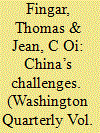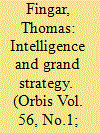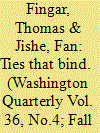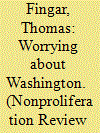| Srl | Item |
| 1 |
ID:
172086


|
|
|
| 2 |
ID:
034398


|
|
|
|
|
| Publication |
Boulder, Westview Press, 1980.
|
| Description |
x, 256p.
|
| Series |
Westview special studies on China and East Asia
|
| Standard Number |
0891585702
|
|
|
|
|
|
|
|
|
|
|
|
Copies: C:1/I:0,R:0,Q:0
Circulation
| Accession# | Call# | Current Location | Status | Policy | Location |
| 019123 | 320.60951/FIN 019123 | Main | On Shelf | General | |
|
|
|
|
| 3 |
ID:
110163


|
|
|
|
|
| Publication |
2012.
|
| Summary/Abstract |
Elegant strategies can be constructed without reference to intelligence but persuading policymakers to implement them without knowing what intelligence might have to say about their likely efficacy and unintended consequences would be exceedingly difficult. Intelligence-derived information and insights should not dictate the goals of grand strategy, but they should inform decisions about what to do, how to do it, and what to look for in order to assess how well or badly the strategy is working.
The relationship between intelligence and grand strategy is similar to the relationship of intelligence to policymaking. Grand strategists, like policymakers, can-and often do-formulate plans and develop policies without seeking or heeding information and insights from intelligence analysts.1 History is replete with examples of smart people who developed compelling theories of international relations and/or effective strategies to protect and pursue the interests of their countries without reliance on inputs from spies, satellites, analysts, or other accoutrements of intelligence.
|
|
|
|
|
|
|
|
|
|
|
|
|
|
|
|
| 4 |
ID:
126867


|
|
|
| 5 |
ID:
102384


|
|
|
|
|
| Publication |
2011.
|
| Summary/Abstract |
Chinese commentators assessing the 2010 US Nuclear Posture Review (NPR) acknowledged a number of ways in which they felt it was "better" than the 2001 NPR but still found much to criticize and many reasons for concern regarding the review's implications for China and for strategic stability. They welcomed the reduction of US nuclear inventories and reliance on nuclear weapons, the commitments to seek ratification of the Comprehensive Nuclear-Test-Ban Treaty and to not conduct nuclear tests, the declaration that the United States would continue to reduce the role of nuclear weapons in deterring non-nuclear attacks, and a number of other points. Commentators generally devoted more attention to issues that were seen to have negative implications for China's deterrent (e.g., continued development of missile defense capabilities and advanced conventional weapons). Their assessments of the NPR were initially colored by the downturn in Sino-US relations in the months prior to the review's release but became more positive as the overall bilateral relationship improved.
|
|
|
|
|
|
|
|
|
|
|
|
|
|
|
|